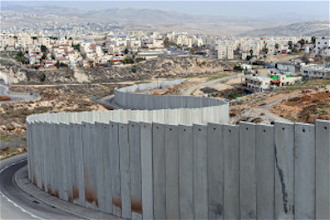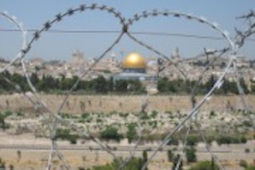Westminster J&P urges churches to endorse Kairos Palestine document

As dramatic events have been unfolding in the Middle East this week, the Westminster Justice and Peace Commission have issued a statement appealing for churches in the UK to do more to support the suffering people of the Holy Land. They write:
The events in Egypt, Tunisia and Yemen have focused world attention yet again on the Middle East. One small area in that region which continues to suffer is Palestine, where basic human rights seem as far away as ever. This seems an opportune time for the Justice and Peace Commission to redress a regrettable silence in endorsing a poignant Christian statement which emerged from Palestine nearly 15 months ago. To date it has received very little attention from any of the Christian churches in this country.
We at the Diocese of Westminster Justice and Peace Commission welcome the Kairos Palestine document, A Moment of Truth, published in December 2009 by the Christian leaders of Palestine. We invite other Christians to add their support.
This document declares “that the Israeli occupation of Palestinian land is a sin against God and humanity because it deprives the Palestinians of their basic human rights, bestowed by God”, distorting “the image of God in the Israeli who has become an occupier just as it distorts this image in the Palestinian living under occupation”.As well as addressing Palestinian Christians, Palestinian Muslims, and Israeli Jews, a key part of the Palestinian Kairos call is to the Church in the West, hence the imperative that Church groups such as Justice and Peace should respond.
At the same time as calling for “repentance”, the declaration affirms and celebrates the “prophetic” mission of the Church; “to speak the Word of God courageously, honestly and lovingly in the local context and in the midst of daily events”, and to “stand alongside” the “oppressed”. The Justice and Peace Commission wishes to acknowledge the need for repentance for the sufferings of the people of Palestine, and for any effort lacking in our peace – making, and to identify with the oppressed people of Palestine, who are daily subjected to evictions and deprivations on every level.
We can express our solidarity with the Palestinians in many ways, all of them non-violent, and the Christian signatories of the document ask a question to Christians internationally: “Are you able to help us get our freedom back, for this is the only way you can help the two peoples attain justice, peace, security and love?”
While the Commission is committed to “take a position of truth with regard to Israel’s occupation of Palestinian land”, they feel that boycott and disinvestment are not the only, or most accessible tools of response available to Christians. They would also advocate prayer, particularly the ‘Wave of Prayer’ of the World Council of Churches, and other actions such as selling Palestinian products like olive oil and handcrafts in churches, organising a visit to an MP during surgery hours to express support for Palestinian rights, becoming more aware, through organizations such as Palestine Solidarity Campaign, twinning one’s church, community or school with a Palestinian counterpart in Palestine/Israel, and of course investigating whether one’s organization does in fact profit from the Israeli occupation.
Whatever the non-violent means used, the Commission believes that justice for Palestinians is a paramount concern, in a country where their land and homes are being eroded by the day, and that the Palestinian Christians hold a unique message of reconciling love in this seemingly impossible divide. Here the Palestinian Christian leaders express in the Kairos Document a hope and vision for the future – “love and living together” to the Muslims and Jews of the Holy Land, condemning “all forms of racism”. The Palestine Kairos call is for a “common vision, built on equality and sharing, not on superiority, negation of the other or aggression, using the pretext of fear and security”. It is thus that “justice and security will be attained for all”.
The Commission pledges to do what it can to further this vision.
Source: Westminster Justice and Peace


















